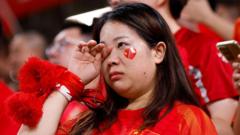China's football ambitions once shaped by President Xi Jinping have hit rock bottom, following a demoralizing loss against Japan that marked their worst-ever World Cup qualifying defeat. The team ranked 90th globally, just over Luxembourg, has suffered a string of losses that reflects the country's dismal state in the sport. Players and coaches alike face further scrutiny as allegations of match-fixing and corruption surface, resulting in mass arrests linked to bribery.
These events overshadowed Xi's original vision for promoting football excellence, which aimed for China to host and even win the World Cup. His dream now appears defunct as the Communist Party's grip on the sport remains strong, stifling necessary reforms and grassroots growth. Without proper development structures, as seen in more successful football nations, China's aspiration falters. Meanwhile, the women's team offers a glimmer of hope, yet the men's side remains mired in controversy and poor performances, raising questions about the direction of football in the country.
Despite an evident passion for the sport among fans, the systemic issues in Chinese football have manifested in increasingly dire scenarios. Fan sentiments range from humor to resignation, indicating the fragile state of national pride connected to the team. As China grapples with its football failures, the need for genuine grassroots support and fewer political constraints stands at a crossroads, leaving the country pondering its future in the beautiful game.
These events overshadowed Xi's original vision for promoting football excellence, which aimed for China to host and even win the World Cup. His dream now appears defunct as the Communist Party's grip on the sport remains strong, stifling necessary reforms and grassroots growth. Without proper development structures, as seen in more successful football nations, China's aspiration falters. Meanwhile, the women's team offers a glimmer of hope, yet the men's side remains mired in controversy and poor performances, raising questions about the direction of football in the country.
Despite an evident passion for the sport among fans, the systemic issues in Chinese football have manifested in increasingly dire scenarios. Fan sentiments range from humor to resignation, indicating the fragile state of national pride connected to the team. As China grapples with its football failures, the need for genuine grassroots support and fewer political constraints stands at a crossroads, leaving the country pondering its future in the beautiful game.



















